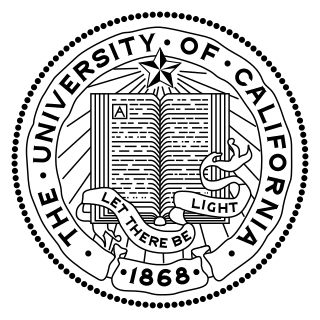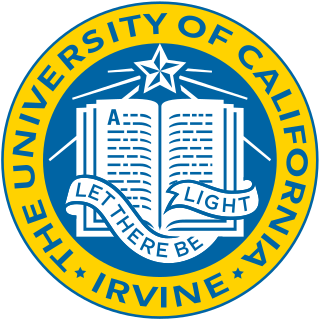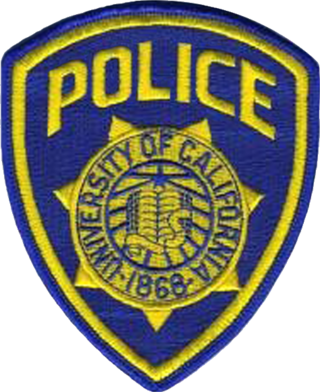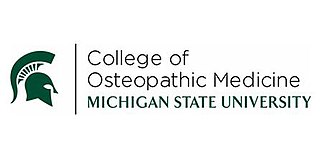
The University of California, San Francisco (UCSF), is a public land-grant research university in San Francisco, California. It is part of the University of California system and is dedicated entirely to health science and life science. It conducts research and teaching in medical and biological sciences.

The University of California (UC) is a public land-grant research university system in the U.S. state of California. Headquartered in Oakland, the system is composed of its ten campuses at Berkeley, Davis, Irvine, Los Angeles, Merced, Riverside, San Diego, San Francisco, Santa Barbara, and Santa Cruz, along with numerous research centers and academic centers abroad. The system is the state's land-grant university.

The University of California, Irvine is a public land-grant research university in Irvine, California, United States. One of the ten campuses of the University of California system, UCI offers 87 undergraduate degrees and 129 graduate and professional degrees, and roughly 30,000 undergraduates and 6,000 graduate students were enrolled at UCI as of Fall 2019. The university is classified among "R1: Doctoral Universities – Very high research activity" and had $523.7 million in research and development expenditures in 2021. UCI became a member of the Association of American Universities in 1996.

Henry Samueli is an American businessman, engineer, and philanthropist. He is a co-founder of Broadcom Corporation, owner of the National Hockey League's Anaheim Ducks, and a prominent philanthropist in the Orange County, California community. He is chairman of Broadcom Inc. He is also a professor in the Electrical and Computer Engineering Department at UCLA, and a distinguished adjunct professor in the Electrical Engineering and Computer Science Department at UC Irvine.

The University of California, Irvine Medical Center is a major research hospital located in Orange, California. It is the teaching hospital for the University of California, Irvine School of Medicine.
Western State College of Law at Westcliff University is a private, for-profit law school in Irvine, California. It offers full and part-time programs and is approved by the American Bar Association. Western State pays a fee to receive services from the Association of American Law Schools (AALS).

Western University of Health Sciences (WesternU) is a private medical university in Pomona, California. With an enrollment of 3,724 students (2022–23), WesternU offers more than twenty academic programs in multiple colleges. It also operates an additional campus in Lebanon, Oregon.

The University of California, San Diego School of Medicine is the graduate medical school of the University of California, San Diego, a public land-grant research university in La Jolla, California. It was the third medical school in the University of California system, after those established at UCSF and UCLA, and is the only medical school in the San Diego metropolitan area. It is closely affiliated with the medical centers that are part of UC San Diego Health.

Daniel Gaskill Aldrich, Jr. was the founding chancellor at the University of California, Irvine from 1962 to 1984. He also served as acting chancellor at the University of California, Santa Barbara from 1986 to 1987 and acting chancellor at the University of California, Riverside from 1984 to 1985.

The police departments of the University of California system are charged with providing law enforcement to each of the system's campuses.

Kansas City University (KCU) is a private medical school with its main campus in Kansas City, Missouri and an additional campus in Joplin, Missouri. Founded in 1916, KCU is one of the original osteopathic medical schools in the United States. It consists of both a College of Osteopathic Medicine and a College of Biosciences. KCU is one of the largest medical schools in the nation by enrollment.
Osteopathic Physicians & Surgeons v. California Medical Association, 224 Cal. App. 2d 378 was a legal case between two medical associations in the state of California. The case was under review in California state courts from 1962-1964. After numerous appeals, the California Supreme Court ruling found the California Medical Association's refusal to grant osteopathic physicians licensure to practice medicine in the state of California to be unconstitutional.
The University of California, Irvine has over fourteen academic divisions.

The Henry Samueli School of Engineering (HSSoE) is the academic unit of the University of California, Irvine that oversees academic research and teaching in disciplines of the field of engineering. Established when the campus opened in 1965, the school consists of five departments, each of which is involved in academic research in its specific field, as well as several interdisciplinary fields. The school confers Bachelor of Science, Master of Science, and Doctor of Philosophy degrees.

The Michigan State University College of Osteopathic Medicine (MSUCOM) is one of the two public medical schools of Michigan State University, a public land-grant research university in East Lansing, Michigan. The college grants the Doctor of Osteopathic Medicine (D.O.) degree, as well as a DO-PhD combined degree for students interested in training as physician-scientists. MSUCOM operates two satellite campuses in Clinton Township and Detroit. The college is accredited by the American Osteopathic Association's Commission on Osteopathic College Accreditation (COCA) and by the Higher Learning Commission.

The College of Osteopathic Medicine of the Pacific (COMP) is a private medical school for osteopathic medicine located in downtown Pomona, California. The college opened in 1977 as the only osteopathic medical school west of the Rocky Mountains. COMP was the founding program of Western University of Health Sciences (WesternU), which now has eight colleges in addition to COMP, each offering professional degrees in various fields of healthcare. COMP has a single four-year program, conferring the Doctor of Osteopathic Medicine (D.O.) degree. Graduates are eligible to practice medicine in all 50 states and more than 85 countries.
The UCSF Graduate Division is the graduate school of the University of California, San Francisco, and is located in San Francisco. It is recognized as one of the premier biomedical graduate schools in the United States. It offers 19 PhD programs, 11 MS programs, two certificates and a physical therapy program.

California Health Sciences University (CHSU) is a private, for-profit university located in Clovis, California. Founded in 2012, the school currently operates two academic programs, one offering a doctorate degree in medicine and the second offering a masters degree in science. Graduates of the College of Osteopathic Medicine (COM) will receive the Doctor of Osteopathic Medicine (DO) degree, and graduates of the College of Biosciences and Health Professions (CBHP) will receive the Masters of Science in Biomedical Sciences (MSBS) degree. The school had previously also offered a Doctor of Pharmacy (Pharm.D.) degree but no longer offers it.
UCI Medical Center Irvine–Newport is an acute care, ambulatory care, and cancer research facility on the northern end of the University of California, Irvine campus. The center will be a part of the larger Presidential Gateway, a 202-acre area of the campus that will also house therapeutic gardens, nature trails, and a research preserve. The construction of the hospital will bring UCI Health urgent care services onto the main campus for the first time, as the original UCI Medical Center is located 13 miles away in Orange.

















